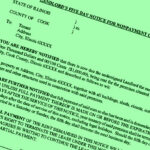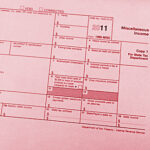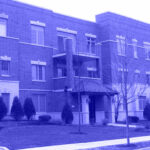The Toledo Blade reports that earlier this week, an Ohio landlord was indicted on charges of reckless homicide in the carbon monoxide deaths of four tenants in the landlord’s rental unit. Allegedly the landlord supplied the tenants with a faulty space heater because the rental unit did not have an operating furnace. The rental unit also supposedly lacked carbon monoxide detectors. Unfortunately, stories like this are all too common. In October, 2010, a New York landlord was sentenced to criminal charges in connection with the carbon monoxide deaths of three tenants resulting from the installation of a gas-powered generator in a rental unit. In many cases, landlords might be criminally or civilly responsible for carbon monoxide related injuries.
When will Cook County Sheriff’s case load return to normal?
 I am working on an eviction case right now that needed to be placed with the Cook County Sheriff for execution. The attorney who went to the Sheriff’s office to place it spoke to someone at the desk there (I know, hearsay) who informed him that the Sheriff is running at about a ten week minimum time to get out to evict the defendant in the case. Ten weeks is a long time. Unfortunately,
I am working on an eviction case right now that needed to be placed with the Cook County Sheriff for execution. The attorney who went to the Sheriff’s office to place it spoke to someone at the desk there (I know, hearsay) who informed him that the Sheriff is running at about a ten week minimum time to get out to evict the defendant in the case. Ten weeks is a long time. Unfortunately,
North Chicago’s Landlord Licensing Law
In mid-2010, the City of North Chicago passed a new ordinance (number 2010-75) requiring the regulation of rental buildings and the licensing of landlords within the city limits. The new law makes it illegal for any party to rent without a landlord license. Licenses are to cost $35 per building address per year. Licenses expire annually on April 30 or when title to at least 50% of the real estate is transferred. While the North Chicago law is not as expansive as the laws in Chicago and Evanston, the municipality now joins the ranks of the small number of municipalities who regulate local residential rental activities.
The Illinois Landlord’s Responsibility For Dog Bites
You can’t go anywhere in the City of Chicago without seeing a dog. The Chicago Park District lists no fewer than eighteen dog parks in the City of Chicago. Whether or not allow pets, especially dogs, is a question that regularly confronts landlords. On the plus side, allowing pets usually expands a landlord’s pool of available renters making marketing time shorter and less expensive. On one hand, pets can cause lots of damage to rental units, drive away “allergic” tenants, and cause noise problems for neighbors. A landlord also needs to consider what would happen if a pet in the landlord’s building attacked another person. Is a landlord responsible for damage to third parties caused by a tenant’s pet?
Partial Payment after 5 Day Notice in Chicago
 The first step in just about all evictions for nonpayment of rent is to serve a notice for non-payment of rent. Unless the cure period is modified (or even waived in some jurisdictions), this is usually a five day notice. Once the notice is served, the tenant has five days to make payment in full to avoid an eviction.
The first step in just about all evictions for nonpayment of rent is to serve a notice for non-payment of rent. Unless the cure period is modified (or even waived in some jurisdictions), this is usually a five day notice. Once the notice is served, the tenant has five days to make payment in full to avoid an eviction.
New 1099-MISC Reporting Requirements and Possible Relief
 The Small Business Jobs Act of 2010 (aka SBJA) enacted by President Obama in September, 2010 and the 2010 Patient Protection and Affordable Care Act (health care reform aka PPACA) both contain new 1099 reporting requirements that affect landlords. These two laws expanded IRS Form 1099-MISC reporting requirements – the SBJA dealing with landlords and services / service providers and the PPACA dealing with landlords and goods.
The Small Business Jobs Act of 2010 (aka SBJA) enacted by President Obama in September, 2010 and the 2010 Patient Protection and Affordable Care Act (health care reform aka PPACA) both contain new 1099 reporting requirements that affect landlords. These two laws expanded IRS Form 1099-MISC reporting requirements – the SBJA dealing with landlords and services / service providers and the PPACA dealing with landlords and goods.
What about the Landlord’s Agent?
As I mentioned a few weeks back, the rental world is getting to be “cluttered” with first time landlords. These landlords are born onto the scene, usually, after their real estate sits unsold on the market for six or ten months. Eventually, the property owner decides to enter the world of landlording.
Most of these first time landlords arrive at the decision to become a leasing mogul at the suggestion of their real estate agent. It goes something like this:
Snow Removal in Chicago and Illinois
 Laws about Landlord and tenant responsibility to shovel snow
Laws about Landlord and tenant responsibility to shovel snow
Snowmageddon 2011. What’s a landlord to do? Well, that depends on where the landlord’s property is located. The Chicago Sun Times ran a story reminding property owners about the obligation to shovel snow on their sidewalks within the City of Chicago. My friend Tim Tomasik from the Clifford Law Offices was even quoted in the story advising folks to shovel.
Rentals on the rise in Chicago?
 A recent blog article in the Wall Street Journal indicates that landlords have “seize[d] the upper hand in [the] apartment market”. This is an interesting development. The article cites the all too common shift where former homeowners are losing their properties to foreclosure and becoming renters. The article specifically singles out Chicago as a place where a renter’s rent is going up from “$765 from $720” because landlords “know they can get more for my unit”. This certainly bodes well for landlords who want to keep their rental units filled.
A recent blog article in the Wall Street Journal indicates that landlords have “seize[d] the upper hand in [the] apartment market”. This is an interesting development. The article cites the all too common shift where former homeowners are losing their properties to foreclosure and becoming renters. The article specifically singles out Chicago as a place where a renter’s rent is going up from “$765 from $720” because landlords “know they can get more for my unit”. This certainly bodes well for landlords who want to keep their rental units filled.
Brrr…. cold weather gives tenants a reprieve
The Cook County Sheriff is indicating today that because of the cold weather, evictions for today are canceled and will be rescheduled. There is no word on tomorrow’s schedule yet, but chances are, until this cold front is gone, expect that the Sheriff will be unable to get out to remove tenants.
